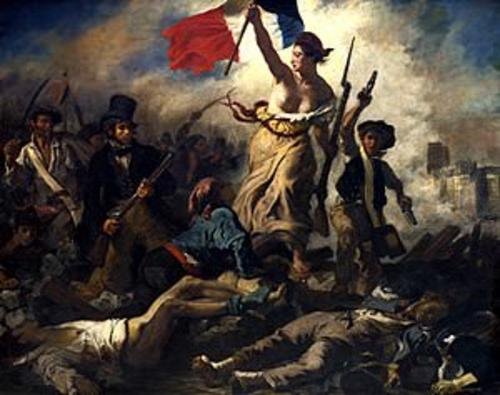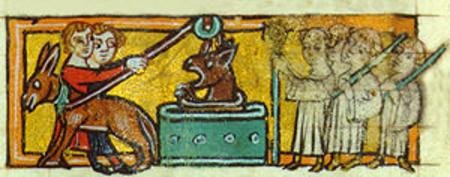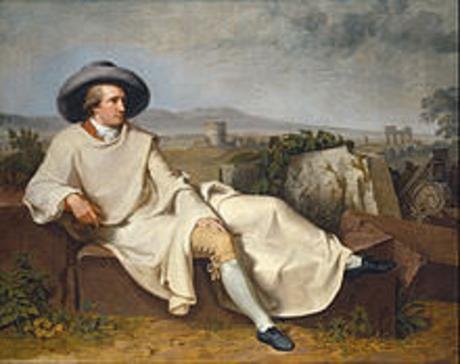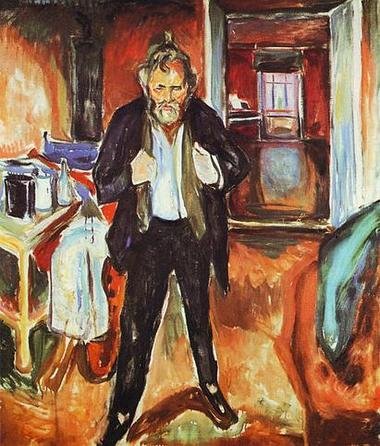ADSactly Literature - How Did Literature Become Modern?
How did literature become modern?

How did literature become modern?
Greetings, dear @adsactly readers. I start as an author in this blog, after some time following the interesting and various productions that are published here. I intend to offer you a thematic series that may be of interest to all of you, especially to readers of literature. It is about presenting you with a panoramic vision, as if it were a walk, through the origin and development of modern western literature, making brief stops in some parts and primordial representatives. I hope it is to your liking and motivation.
***
The first thing is a basic clarification. We must be aware that the term modern is controversial (and even ambiguous) in its meaning. How many times it is used without knowing exactly what is meant by that word. Its first and principal meaning has to do with its origin, that is, its etymology. Scholars point out that the origin of the adjective "modern" appears in Latin at the end of the 5th century as "modernus", coming from modo which means "recently, recently, now"; it designates what is present, what is present, what is present, what is spoken of, and would thus be distinguished from what is old or what is ancient. As is logical, the word will evolve and be loaded with a certain complexity; for example, how the distance between the present and the past is almost eliminated, making the old something "new" through change (fashion is its demonstration).
From modern other words will be derived later, such as modernity, whose birth is located in the nineteenth century (with two important writers: Balzac and Baudelaire), noun key to our approach. Modernity** can be understood in two complementary ways: as an epoch and as a culture.

As an epoch, there are two different theses: the one that places its beginnings in the Renaissance, relating it to the appearance of the bourgeoisie, the Reformation and the expeditions of discovery of other regions, such as America. And the other thesis, with greater support, which situates it towards the second half of the 18th century, linking it to that European intellectual moment called Illustration (or Iluminism), which had its location in England, Germany and especially in France, with thinkers such as Diderot, Voltaire, Montesquieu, Rousseau, etc. There the changes and values that will rule until our days are incubated and settled.
As culture, modernity inherits and inaugurates an era (which for many is not yet over) whose distinctive feature will be critique: of religion, morality, politics, philosophy, art. From it, from critical reason, arose or renewed the cardinal ideas that still move us: progress, freedom, fraternity, democracy, autonomy, revolution, rationality, among others.

But how do modernity and literature fit together? What drives or concretizes literary modernity? The answer lies in Romanticism, considered the first aesthetic movement, particularly literary, of modernity. The etymology of the word that serves as its name has different explanations; the most accepted is that which associates it with the English adjective "romantic" or the French "roman", both related to the "old novels" with the "romance" (chivalrous song or story, and hence the relationship with Christianity), which connects the term with the sense of the fictitious, the unreal, the unusual.
The origins of Romanticism can be found at the end of the 18th century with advanced artists such as Goethe and Schiller in Germany, James Thompson in England and Chateaubriand in France. But its development will be in the first half of the nineteenth century, and its main achievements in the three countries indicated: Germany, England and France, extending to all of Europe then and then traveling to America.

Numerous specialized studies have been written on this cultural movement that marks the beginning of modern Western literature, where it is characterized. The writer Octavio Paz (Mexican, Nobel Peace Prize laureate) synthesizes its transcendent meaning in this way:
Romanticism was the great change not only in the domain of letters and arts, but in imagination, sensitivity, taste, ideas. It was a moral, an erotic, a politics, a way of dressing and a way of loving, a way of living and dying.
In order to characterize it, it has been said that it is a "revolt of the soul", or an "irruption of the I", because as a movement -diverse and complex- it concentrates that liberation of individual subjectivity that had been, in some way, contained. It becomes an open display of emotions, feelings and passions and, at the same time, a critique of the society that denied or regulated them. It bursts against the rationalism already dominant by then, in rebellion with the rigid social norms and confronted with the prescriptive classics in art. And it will reach in literature (poetry, novel, drama) high manifestations that continue to be obligatory references, as will also happen in painting as well as in music.

Romanticism will therefore be the cradle and a means of modernity, but, at the same time, its critique: confirmation and negation.
References
Compagnon, Antoine (1993). The Five Paradoxes of Modernity. Caracas: Monte Ávila.
Jauss, Hans Robert (2000). Literature as provocation. Barcelona (Spain): Peninsula.
Paz, Octavio (1990). The other voice. Poetry and the end of the century. Barcelona (Spain): Seix Barral.
Authored by @josemalavem
Click on the coin to join our Discord Chat

Witness proposal is here:
Go To Steem Witness Page
In the bottom of the page type: adsactly-witness and press vote.

Use small letters and no "@" sign. Or, click here to vote directly!
Thank you!
Welcome to the team, @josemalavem. It's an honor to have you among our writers at @adsactly. Excellent topic to start with. Very good that you start from the ambiguity that exists in the use of the concept of Modern. In the same way it signals some characteristics that were developed with modernism. Although the changes in Modernity were gradual, they affected everything that had to do with human experience: social life, work, power relations, aesthetic experiences and, of course, literature. individual reflection makes criticism possible, according to modernity, and I join her in saying that I congratulate you on your post. I continue reading you. Thanks to you and @adsactly for sharing.
The problem with the word modern is that by definition it will have to be renamed for later generations
Posted using Partiko Android
I had a lot of trouble with it at school. I excelled in mathematics and physics Hahahah I'm exactly
Posted using Partiko iOS
Muy bueno el artículo, sería interesante incluir como se manifesto el modernismo o el romanticismo en America, ya en el siglo XIX habia una trabajo muy valioso, saludos
Hi, @adsactly!
You just got a 0.85% upvote from SteemPlus!
To get higher upvotes, earn more SteemPlus Points (SPP). On your Steemit wallet, check your SPP balance and click on "How to earn SPP?" to find out all the ways to earn.
If you're not using SteemPlus yet, please check our last posts in here to see the many ways in which SteemPlus can improve your Steem experience on Steemit and Busy.
Felicitaciones, @josemalavem, por esta interesante publicación de inicio en @adsactly. Creo que tendré otro autor de lectura indispensable en este blog. Muy clara tu explicación de los inicios de la literatura en la época moderna a partir del romanticismo. A la espera de más artículos enriquecedores y de calidad, @josemalavem. Gracias a @adsactly por compartirlo.
First of all, I would like to thank @josemalavem for this publication that is so "sweet", educational and without waste. It is fascinating to read the fluidity of this post. One remains anxious to continue reading. Then, now in relation to the whole context, I am totally in agreement with the aspects that you offer about the ways of understanding modernity both from a cultural point of view and from an era. Indeed, I am more inclined towards the two theses that you point out: rebirth and illustration. The contributions of those who are reviewed today in that period were great.
To conclude, I did not know the quote you made from Octavio Paz about Romanticism and its close relationship with Modernity. It is a very condensed but diaphanous statement for any study or investigation of modernity.
Definitely, fascinating @josemalavem. Thanks @adsactly for this kind of publications.
Enlightement post. this post make us know that change will make something better include a modernity.
we often assume that the modern word is a form of change from what is already a situation that we currently enjoy. However, often such thoughts can become overwhelming if we are not wise in reacting. And often the discussion is carried out about and will only be believed to be true after passing its time. Examples in Europe initially taught the theory of flat earth and forbade people to explore the world. This doctrine was then broken with heliocentric and round earth theory so that oceanic exploration was carried out by figures from the Portuguese and Spanish.
there are also many theories that develop and and still experience a period of proof so that one day a new theory will emerge to define or even strengthen the old theory
thank you @josemalavem
thank you @adsactly
thank you steemit for sharing knowledge